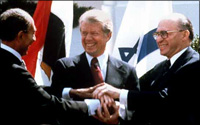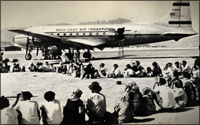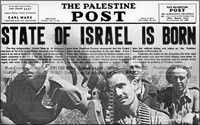 The aftermath of the Yom Kippur War brought about an earthquake in Israeli politics and the Jewish world in general.
The aftermath of the Yom Kippur War brought about an earthquake in Israeli politics and the Jewish world in general.
Instead, Israel found itself in a terrible situation: isolated diplomatically, weighed down under tremendous economic pressures and fearful of a new wave of anti-Semitism that swept the world. When Yasser Arafat appeared before the United Nations and put his gun on the table, and the whole world stood up and cheered, it was a frightening moment for the Jewish people.
The Israeli government in charge during the Yom Kippur War, including Golda Meir and Moshe Dayan, had to resign. They had been heroes – legends. But now that whole generation was discredited by the Yom Kippur War. The mood in the country, even after pulling victory out of the jaws of defeat, was black.
In Golda Meir’s place, Yitzchak Rabin became prime minister. He was supposed to represent the new generation of the Labor Party; the first prime minister now born outside the State of Israel. He was supposed to understand the inner workings of Israeli society. Yet, his tenure was short-lived.
Menachem Begin Begins
Menachem Begin had for 30 years been a political outcast. He had the unenviable record for the most number of ejections from the Israeli parliament. He was not looked upon a buffoon as much as a person to be pitied, as someone who had followed his ideology to its illogical conclusion and would never come to power.
However, Begin was able to put together one of the most unlikely coalitions in the history of the Israeli electorate at that time. In addition to right-wing parties, his ticket attracted a disaffected middle class who saw in the policies of the Labor Party only further economic disaster and, more revolutionary, an entire generation of Sephardic voters, Jews from Arab and Oriental countries who felt that they were being discriminated against by the left-wing government. They felt that their chance to have a meaningful voice in the Israeli society could not come through the Labor Party.
Begin also had a great deal of personal charisma, something which none of the Labor leaders had. They were bureaucrats, not inspiring leaders.
Furthermore, Begin combined in himself a strong sense of Jewish tradition. Though his party, the Herut, was as populated by as many secular and anti-religious Jews as the Labor Party, Begin in his own way was probably the most religiously observant of all Israeli prime ministers. He had made a personal commitment to a religious member of the Knesset that he would not desecrate the Sabbath. He prayed every day and donned tefillin. He was not embarrassed even in the most public places to put a yarmulke (head-covering) on his head and recite a blessing – actions that would have been undreamt of by Rabin or Peres at the time.
For all those reasons, religious Jewry had a warm spot for him and their votes helped swing power to Herut, who pulled off the astonishing surprise victory.
Consequently, in 1977, for the first time since the state was founded in 1948, the Labor Party did not rule the government. It was a stunning upset. Although Labor would win later elections, this turning of events signaled the high water mark of Socialism in Israel. The receding tide of Socialism all over the world was now visible in Israeli politics. Begin’s ascent to power characterized that.
Camp David
Begin took over a country that was broken economically and depressed psychologically. It needed a great deal of morale building.
In one of his early speeches, Begin remarked that he invites Sadat to come to Jerusalem without preconditions to settle the conflict. The invitation did not make the front page of the New York Times. It was just rhetoric. No one expected anything to come of it.
However, Sadat – who was wily, shrewd and opportunistic – realized this was an opening. After the Yom Kippur War, he understood that he did not really have much more than when he began. He also was looking desperately to break his dependence upon the Soviet Union and join the West.
Therefore, one day Sadat, perhaps also rhetorically, announced that he was ready to fly to Jerusalem and address the Israeli Knesset. Whether or not Begin was serious in his initial offer, he now had no choice but to accept.
In the United States, Jimmy Carter had recently been elected president. There was a lot of shuttle diplomacy, broken promises, accusations, etc. Finally, a basic deal was struck: Israel would return the Sinai in exchange for promises of peace. The peace between Israel and Egypt would be a cold peace, but it would be peace.
The Arabs have a bad habit that anyone who talks peace with the Jews gets killed. That inhibits negotiations. It certainly is enough to frighten an Arab leader from making commitments. The greatest proof of that would be Sadat himself, who would be assassinated by fellow Arabs for his peace efforts.
The Teshuvah Movement
The early 1980s marked the rise of a phenomenon that the early generations thought impossible: the Teshuvah Movement, a return to religion by those originally reared in a completely secular fashion. It was not limited to Israel, but existed very strongly there.
The numbers were not large per se, but significant – especially in light of the fact that the returnees came from all walks of life and often represented secular success stories. For instance, Uri Zohar was one of Israel’s most visible and successful entertainers. He not only became a baal teshuvah, one who returns to his Jewish roots and practices the religion, but grew a long rabbinic beard and took up full time learning in an advanced academy (a kollel for married men) in Bnei Brak, the heart of what secular Israeli’s viewed as old-world religion.
Israelis like to pass off such transformations as the actions of fanatics or those who were incapable of succeeding in the secular world. However, Uri Zohar and others (including senior officers in the army) had not only been successful – indeed, represented the height of success – but were able to articulate their views with intelligence.
Organizations that attracted baalei teshuvah (plural of baal teshuvah) came to the fore. Educational institutions designed specifically to cater to the unique needs of secularly-raised Jews, including schools for young women, developed. An entire network built on the principle of outreach to other Jews sprung as if from thin air.
The success reached such proportions that it brought about a reaction. For instance, when a particularly high-ranking pilot announced he was leaving the air force to take up full time study, Rabin, who was the Minister of Defense, announced that he was forbidding religious lecturers from speaking to the army.
Though numerically the Teshuvah Movement may not have been overwhelming, psychologically it was of enormous import. Israel was created and dominated early by secular, even anti-religious Jews. They had assumed that traditional, observant, Orthodox Judaism was dead. David Ben-Gurion based early concessions to the religious community – such as army exemptions for yeshiva students — on the assumption that it would completely vanish in a generation. Now they realized that the Orthodox were not going to disappear – if anything, secular Zionism was dying out. The situation demanded an entire new set of rules than what they had been brought up to believe in.
The Lebanon War
In 1981, there were calls for new elections. The polls showed that Labor, with Shimon Peres at its head, would win. At the end of the campaign, at a rally, he blundered terribly and made an ethnic slur against the Sephardim. He did not do it with malice or forethought, but it slipped out anyway. In the last week, public sentiment swung to Begin and he won again.
Begin formed a new government, and, under the prodding of Sharon, looked for an excuse to eliminate the PLO once and for all. The PLO gave them that excuse when they shot the Israeli ambassador to London in January 1982. Then from their bases in south Lebanon they rained rockets on Israeli settlements in the Galilee.
Finally, in June 1982, Israel initiated Operation Peace for the Galilee. It was a war that began with high hopes. Militarily, the Israeli army destroyed all the bases of the PLO and other terror groups in Lebanon. They defeated a large segment of the Syrian army and shot down over 80 planes with 0 losses of their own.
But they went too far. They encircled Beirut, where the PLO fled to. It was a lose-lose situation. They could not dislodge the terror group without devastating the general population and city. They also made a tremendous mistake when they sided themselves with the Phalangists, a Christian Arab group hoping to regain power in Lebanon. The Phalange army entered two Arab refugee camps and massacred the men, women and children. The Israelis were blamed — either because they were aware or should have been aware of it beforehand. But they were blamed.
In the end, the PLO agreed to leave Beirut if Israel withdrew. The PLO left, Israel withdrew from around Beirut, but not long after the PLO returned anyway. For all its efforts and early victories, Israel gained nothing. Indeed, they lost whatever diplomatic leverage and world sympathy they may have had.
On top of everything, the war was very costly economically and resulted in runaway inflation, driving the country almost to bankruptcy. As the final blow, after Menachem Begin’s wife passed away, he lost heart and resigned.
A History of the Jews
The Jewish Sages commented that in the End of Days, light and dark will function in unison with each other. There will not be a unified gray, but pockets of light co-existing with pockets of darkness. That explains the situation for Jews in Israel and the world.
On one hand, more Jews are returning to their religious roots and more Jewish young men are studying since the time of the Babylonian Talmud. At the same time, Jewish assimilation and intermarriage have reached epic proportions. In all the peripheral, outlying Jewish communities around the world Jews are disappearing. The odds of Jewish survival look dim there.
However, if someone were to ask of the odds of Jewish survival in the Middle Ages or even as recently as the 1940s it did not look promising. The innate quality of the Jewish people to survive is really the hallmark of Jewish history. That hallmark, believing Jews believe, is nothing less than the hand of Providence. The providential hand is not miracles. God, in His own way, is much less dramatic than we want. This does not make God’s hand less, but allows us to see the greatness of the historic process in the Jewish people.
Paul Johnson, a non-Jew, in his A History of the Jews, wrote:
What are we on earth for? Is history merely a series of events whose sum is zero? Is there no fundamental moral difference between the history of the human race and the history of ants? Or is there a providential plan of which we are however humbly somehow agents?
No people have ever insisted more firmly than the Jews that history has a purpose and that humanity has a destiny. At a very early stage in their collective existence they believe they detected a divine scheme for the human race of which their own society was the pilot. They have worked out their role in immense detail. They have clung to it with heroic persistence in the face of savage suffering…. The Jews, therefore, stand at the center of the perennial attempt to give human life the dignity of purpose.












